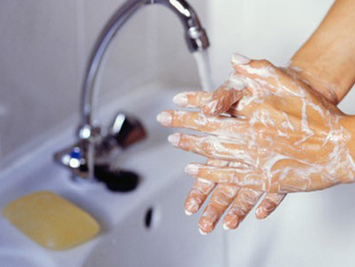Food poisoning is not only incredibly uncomfortable, but in some cases it can also lead to serious illnesses or death. Food poisoning tends to occur in restaurants, but food poisoning occurs in homes as well. Reduce your risk of food poisoning at home by following these basic hygiene tips when preparing food.

1. Wash your hands. Washing your hands is the number one way to prevent the spread of bacteria that can cause food poisoning. Wash every time you handle raw meat, use the bathroom, touch the garbage or attending to children or animals. Dry your hands using one of the air dryers, which should be available if they have a professional cleaning service.
2. Use clean surfaces. Always wash surfaces with hot soapy water before and after food preparation. This is especially important when it comes to raw meat, fish, raw eggs and vegetables.
3. Use multiple cutting boards. It can be convenient to use the same cutting board for all food preparation during a meal, but keep ready-to-eat foods and those that need to be cooked separate. Raw food has bacteria that can spread to countertops, cutting boards and cooking utensils.
4. Separate raw meat from any other food you’re preparing at the same time. Bacteria washes away with hot soapy water, but your ready-to-eat foods such as fruits, salad and bread aren’t washed. Eating food that has come into contact with raw meat puts you at risk of getting food poisoning.
5. Keep your meat on the bottom of the fridge. Raw meat leaks as it defrosts from the freezer and the blood and juices can drip directly onto foods beneath them.
6. Cool your leftovers quickly and refrigerate as soon as possible. Store any leftovers from breakfast, lunch or dinner in the fridge or freezer depending on how long you intend to store it. Leftovers in the fridge should be eaten within two days to minimise the risk of food poisoning due to bacteria growth.
7. Listen to the use-by dates. It is unfortunate when you forget to use a package of meat by its use-by date and need to throw it away, but these dates exist for a reason and ignoring them could potentially lead to a bad case of food poisoning. It is not worth sacrificing your health and taking the risk of food poisoning in order to save money by using expired meat.
8. Keep your refrigerator cool. Don’t leave your refrigerator door open, since it can raise the internal temperature by several degrees in only a few minutes. Ensure that your fridge temperature is set to no higher than 40 degrees Fahrenheit or 5 degrees Celsius to limit bacteria formation.
